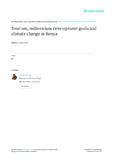| dc.description.abstract | Tourism growth in the last century has been remarkable with a record of 1Billion global arrival
recorded in 2012 and revenues at a tune of USD 1,075 billion. Tourism is also recognized as an
important sector in achieving Millennium development goals including poverty eradication and
provision of livelihood to marginalized societies. However, the sector is faced by the challenge of
changing climate regime because tourism is highly dependent on climate and the environment.
Therefore the viability of tourism is at stake and so it is to most livelihoods especially in developing
countries where tourism plays a significant role. Coupled with uncertainty in climate change research
and scarcity of regional studies most destination managers remain uninformed of possible implication
of the plausible impacts of climate change on their destinations.
Using multidisciplinary secondary sources this paper aims at consolidating information on climate
change impacts and vulnerability of Kenya’s tourism industry to climate change and further discusses
the implication of climate change on the widely popularized role of tourism in contributing to Millennium
Development Goals. The paper also highlights on milestones achieved towards having a National
Policy on Climate Change. Despite limited regional research on climate change impacts on different
tourism regions in the country and current adaptation measures, sea level rise, loss of biodiversity,
temperature rise, desertification and changes in precipitation are expected to have serious implication
on its tourism sector. High dependence on wildlife and beach tourism, struggling economy, population
growth among other stressors makes the country’s tourism sector extremely vulnerable to climate
change. I therefore conclude there is urgent need for urgent measures to respond to climate change. | en_US |

